What are the signs of video game addiction in adults? How do you overcome video game addiction?
Addiction plagues over 20 million Americans. Sadly, only 10% of addicts seek treatment for their condition, with some not even realizing they have a problem.
Behavioral addictions are some of the most difficult to recognize and diagnose. Seemingly normal, even healthy, behaviors can quickly spiral out of control and morph into a debilitating addiction.
Playing video games is one such behavior. There are over 2 billion gamers worldwide and of those, nearly 10% have compulsive addiction issues.
So, how do you draw the line between an interactive pastime and a troubling dependency on video games?
Knowing the top signs of video game addiction in adults is a great place to start. By recognizing these warning signs, you can maintain healthy gaming habits and prevent the negative side effects that accompany addiction.

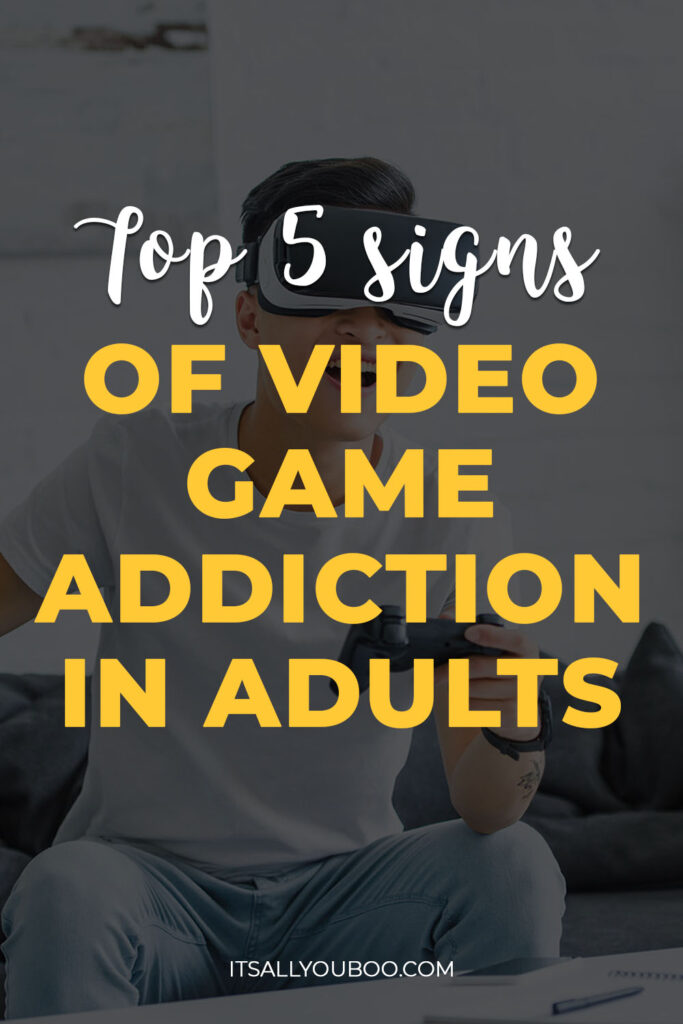
THIS POST MAY CONTAIN AFFILIATE LINKS.
IF YOU MAKE A PURCHASE FROM THESE LINKS, I MAY EARN A SMALL COMMISSION.
CLICK HERE FOR MY FULL DISCLAIMER STATEMENT.
The Top Signs of Video Game Addiction in Adults
Did you know that 72% of all gamers are over the age of 18? Most people associate playing video games with kids but statistics prove otherwise. In fact, 43% of gamers are adults over the age of 35.
So, what does that tell us? That more and more adults are turning to video games for entertainment and stress relief. While, in small doses, this is fine, some adult gamers take their gameplay to the next level.
It’s this group of gamers that we’ll be discussing here.
Video game addiction often flies under the radar because symptoms and warning signs are mild at first. In time, gamers and those around them notice the shift in their mood, personality, and behavior.
Video game addiction in adults is becoming more common and troubling, sparking the creation of courses like The Mindful Gamer, a video game addiction treatment and therapy program. Online programs like these provide gaming addicts with the tools, resources, and information necessary to overcome their addiction.
But how do you know if your gaming habit requires intervention? Let’s take a closer look at the top signs of video game addiction in adults as well as viable treatment options.
👉🏽 RELATED POST: How to Deal with Social Anxiety
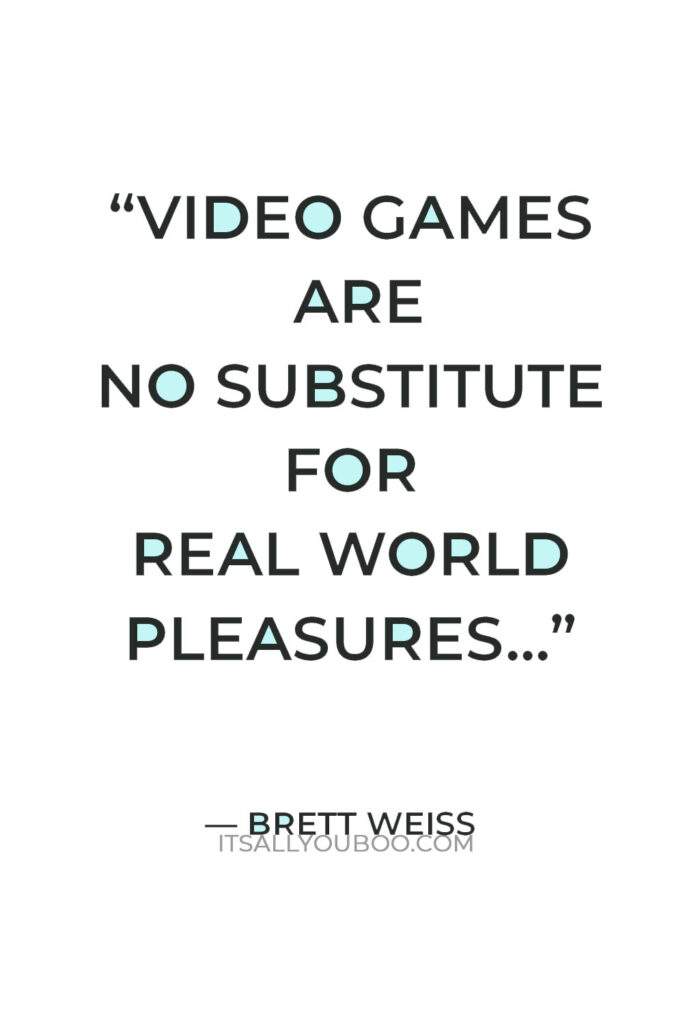
#1. Obsessively Thinking About Video Games
One of the most obvious signs of video game addiction in adults is obsessive thoughts. Do you eat, sleep, and live for video games? If so, your hobby might be turning into an addiction.
Many gaming addicts find themselves distracted by thoughts of their next battle, challenge, or level. These thoughts become all-consuming, making it difficult to focus on much else.
The inability to concentrate on everyday tasks or responsibilities can negatively impact both your professional and personal relationships.
Obsessively thinking about video games makes it difficult to hold a conversation or complete important assignments and tasks at work, school, or at home.
Compromised personal hygiene, insomnia, and weight gain are also common signs of video game addiction in adults as your desire to play trumps all else.
👉🏽 RELATED POST: Can’t Sleep? Try these Good Sleep Hygiene Tips
#2. Mood Swings and Irritability
Video game addiction can completely transform your mood, personality, and overall demeanor. Like most addictions, some adults experience withdrawal symptoms when something interferes with their stimulus of choice. In this case, video games.
Not being able to play when you want to can cause feelings of frustration, anger, and even anxiety. You may also find yourself getting angry and having violent outbursts when things don’t go your way during a game.
There’s also a scientific explanation of the sudden mood swings that gaming addicts exhibit. Over time, your body and brain may actually become physically dependent on video games to regulate your emotions.
Many adults play video games as a form of stress relief. By doing so, your brain releases chemicals like dopamine and serotonin, which create feelings of happiness and relaxation.
👉🏽 RELATED POST: How to Improve Emotional Wellness
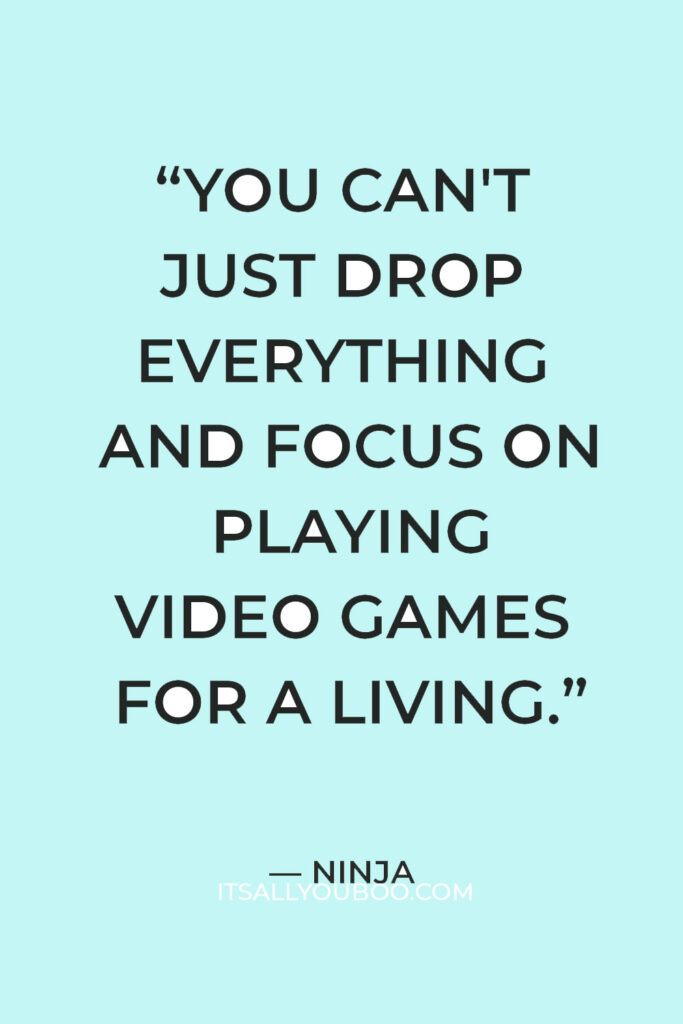
Before long your body starts to associate playing video games with feeling happy and stress-free. Now, your body relies on these games to achieve happiness.
But like any other “drug”, an hour of gameplay won’t achieve the same results and you’ll be compelled to play for two hours. In time, your brain will require several hours of gameplay and stimulation to deliver the same level of relaxation.
Without access to this stimulus, you may start feeling irritable, angry, and even depressed (more on this in a minute).
👉🏽 RELATED POST: Communication Is Key to Relationships
#3. Strained Personal Relationships
When your life is consumed by addiction, one of the first things to suffer is your personal relationships. Whether you’re in a romantic relationship or not, if video games are replacing your friends and loved ones, you may be at risk for addiction.
Aside from the community groups and chat forums online, playing video games is a fairly isolating activity. It’s you, your headset, controller, and the game. Even MMO (massively multiplayer online) games that allow you to connect with other players across the world, pull you into an alternate universe that’s far removed from reality.
Some gaming addicts feel as though their friends and loved ones don’t understand the importance of video games. They become withdrawn and start declining invitations to participate in activities outside the house.
You may also find yourself lying to those closest to you. Some video game addicts lie about how often they play, while others lie in order to play.
Breaking plans, lying about being busy or sick, or sneaking away to play are all dishonest behaviors that can strain important relationships and create distrust.
Failing to engage with others or put in the time and effort needed to foster relationships are warning signs that video games are taking precedence over the healthy relationships in your life.
👉🏽 RELATED POST: Relationships Advice Quotes for Him and Her
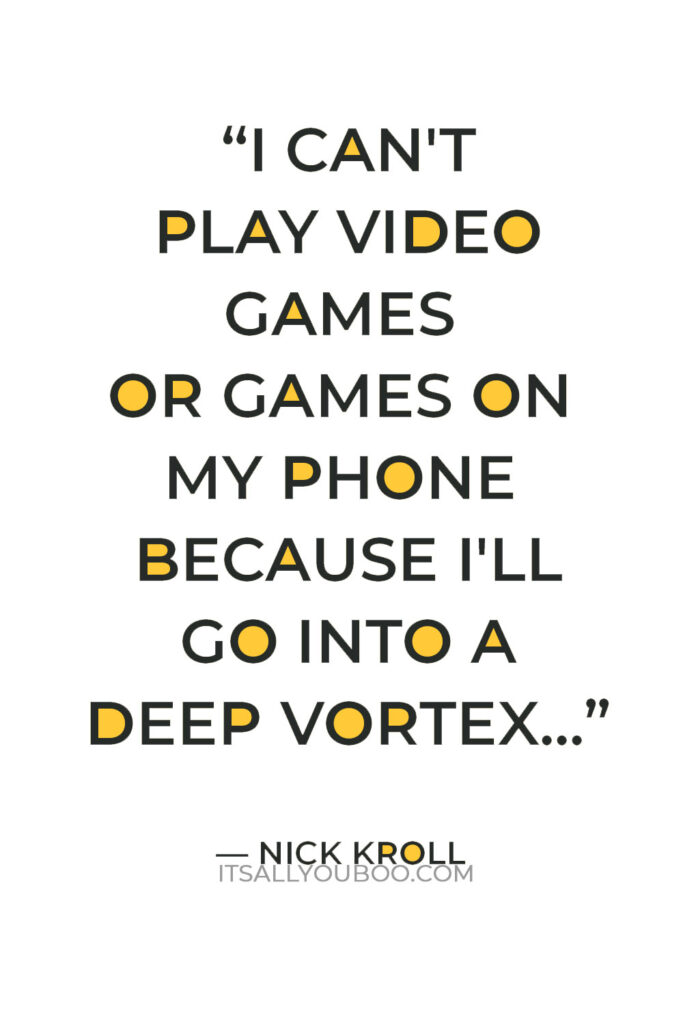
#4. Poor Work Performance
Not showing up for yourself or your loved ones isn’t the only warning sign of video game addiction in adults. Failing to uphold your responsibilities and obligations at work is an entirely different, and equally serious, warning sign.
When you’re preoccupied with gaming, you may find it difficult to stay on task at work. The more your mind wanders, the less able you are to fulfill your job requirements. You’re also more likely to make careless errors and mistakes.
Some addicts go as far as to call out of work sick in order to stay home and play video games. If you do show up, you might find yourself playing internet games instead of doing your job.
All of these behaviors can put your job and your livelihood at risk.
👉🏽 RELATED POST: Can't Focus When Working From Home?
#5. Anxiety and Depression
Anxiety is the leading mental health issue in the world, affecting over 40 million adults. The connection between anxiety and depression and video game addiction is a compelling one.
While some believe video game addiction causes anxiety and depression, others believe the opposite is true. So, what exactly is the correlation?
People suffering from anxiety and depression are often introverts and enjoy limited outside interaction. Because of this, the highly social yet private world of video gameplay is extremely appealing.
Video games also offer a distraction and relief from the negative feelings that plague those with depression and anxiety. Not only are video games entertaining, but they also provide stress relief and create feelings of happiness, even if it’s short-lived.
👉🏽 RELATED POST: 4 Ways to Deal with Panic Attacks
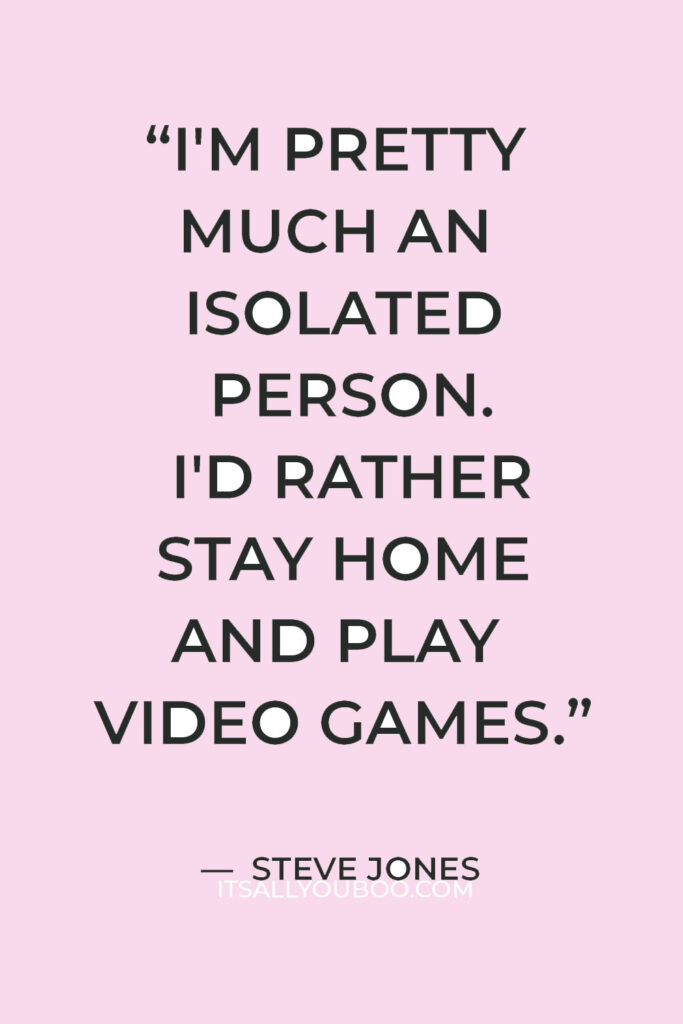
On the other hand, an unhealthy obsession with video games can actually cause depression and anxiety in otherwise healthy individuals. In fact, people who play video games are twice as likely to fall victim to depression as those that don’t.
Studies show that excessive gameplay can cause dopamine exhaustion, lack of motivation, and emotional suppression.
Anxiety over the inability to play is also common. Those with anxiety are also at greater risk for impulsivity and issues with self-control which are associated with anxiety disorders.
👉🏽 RELATED POST: 84 Inspirational Quotes About Staying Calm
How to Treat Signs of Video Game Addiction in Adults
Some people might think video game addiction in adults isn’t a serious condition but the truth is, it can destroy a person’s life as easily as any other dependency.
Knowing the warning signs of video game addiction in adults is step one of the recovery processes. Finding and accepting video game addiction treatment is the next piece of the puzzle.
Here are some of the most common and widely used treatment options for video game addiction.
#1. Detox
Detox is often associated with rehab and drug or alcohol addiction. The truth is, a person can detox from anything, including video games.
By definition, a detox is a period of time where you abstain or rid your body of unhealthy substances or behaviors. If you’re starting to recognize some of these video addiction warning signs, you can take action today by committing to a 30-, 60- or 90-day detox program.
Start by choosing a specific time period in which you won’t play video games at all. This includes Internet games, gaming on your mobile device, or playing on a PC or console.
Some tips for success include removing or hiding your gaming device and spending more time outside the house to avoid temptation. You can also remove all games and apps from your phone and computer to help reduce the urge to play.
If you’re not ready to go “cold turkey”, you can start your detox by setting a timer for gameplay. Only allow yourself to play video games for a specific period of time during the day. This technique will help slowly wean you off of video games without the shock of a complete detox.
👉🏽 RELATED POST: 15 Daily Mental Health Activities
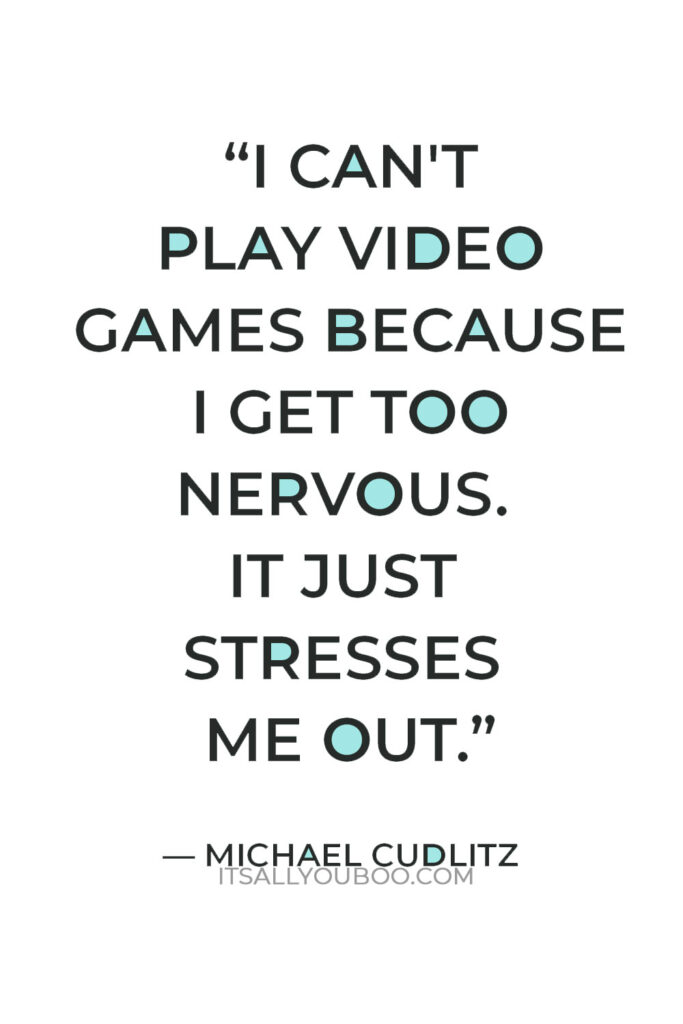
#2. Cognitive Behavioral Therapy
Cognitive Behavioral Therapy (CBT) is one of the most common forms of therapy to treat behavioral addictions. These include gambling, and Internet Gaming Disorder (as it’s labeled in the DSM-5). CBT is a common technique used during in-person therapy sessions and is growing in popularity as a useful tool for online courses and treatment programs as well.
The purpose of CBT is to recognize negative thought patterns and behaviors and learn to reframe your thoughts and help you react in a more positive way. Through plenty of practice and guided exercises, video game addicts can identify their triggers, acknowledge their emotional reactions to those triggers, and choose a healthier reaction that doesn’t involve gaming.
One such CBT technique found in the Mindful Gamer therapy program is keeping a trigger journal. Gamers are encouraged to document each time they get the urge to play and what triggers the temptation in a journal. Triggers can include advertisements for video games or gaming accessories, a chat invite from a friend, or even hearing a particular song that reminds you of your favorite game.
By documenting these moments for several days, you’ll start to see a pattern in both your triggers and your response to them. Recognizing these patterns is one of the first steps in CBT treatment and helps break the emotional connection that gaming addicts have to specific stimuli.
👉🏽 RELATED POST: How To Start Journaling Every Day
#3. Acceptance and Commitment Therapy
Acceptance and Commitment Therapy (ACT) is another popular treatment option for video game addiction. Similar to CBT, ACT also teaches gaming addicts to notice and accept their feelings but focuses less on taking action to control those thoughts and behaviors.
Instead, ACT teaches gaming addicts to embrace their triggers and emotions, accept them, and then let them go. One way to adopt ACT as a technique for battling video game addiction is simply by changing your vocabulary and thought process.
👉🏽 RELATED POST: How to Get Comfortable WIth Yourself
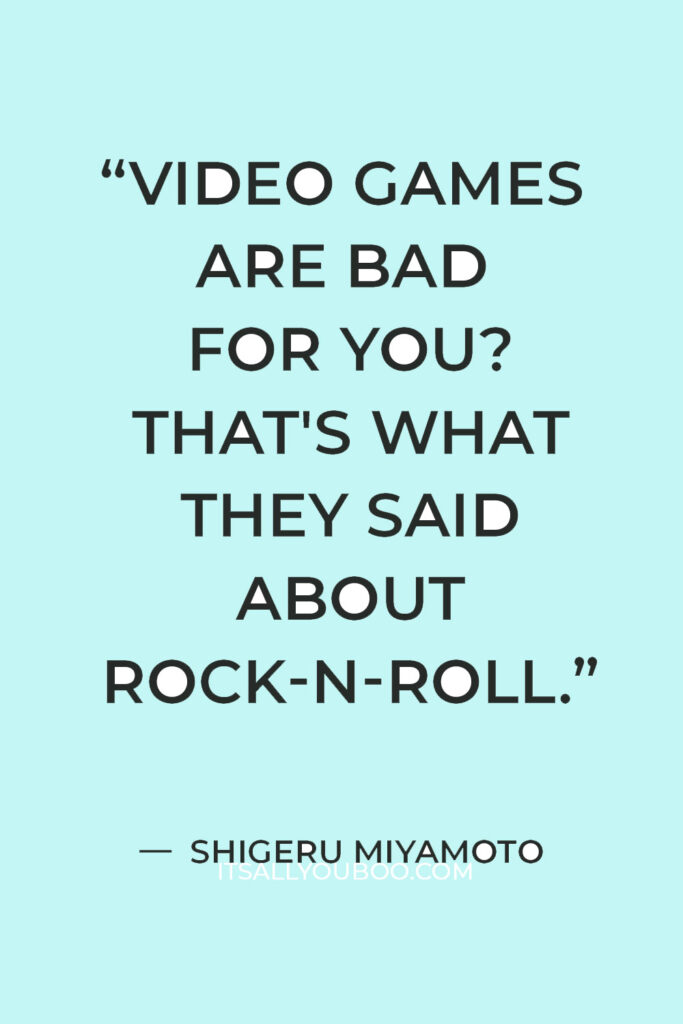
For example, instead of saying, “I want to stop playing video games but I’m too stressed out”, ACT encourages you to say, “I want to stop playing video games and I’m stressed about it.”
This subtle change in wording removes the negativity and pessimism from the initial statement and transforms it into one of empathy and acceptance. Once you accept that you feel stressed about not being able to play video games, you’ll slowly become accustomed to this uncomfortable feeling and learn to push past the discomfort to find success and happiness free from addiction.
👉🏽 RELATED POST: 48 Quotes About Being Calm Under Pressure
#4. Mindfulness and Meditation
Most signs of video game addiction in adults are rooted in emotion. Using CBT techniques like the trigger journal mentioned above helps bridge the gap between the act of playing video games and the emotion that triggered the urge to play.
Mindfulness and meditation are designed to help addicts connect with their thoughts and feelings on a deeper level. Not only does mindfulness help you recognize and accept your emotions but also acknowledge them before letting them go.
One such technique is the mindful question method. During this exercise, gaming addicts learn to recognize and accept their urge to play. By doing so, they prevent the urge from growing in strength and intensity. In time, you learn that these emotions are present but they don’t control or define you.
Examples of questions to ask yourself during this mindfulness exercise include:
- Can I become aware of this situation?
- Can I observe this experience the way a scientist observes a specimen?
- Can I become aware of my breath and body?
- Can I open up to this experience?
- Can I let this experience be what it is and just let it be?
All of these questions help you to acknowledge your emotions and accept them without giving them power over you. It allows them to exist within you without allowing them to control you.
👉🏽 RELATED POST: How to Break a Bad Habit
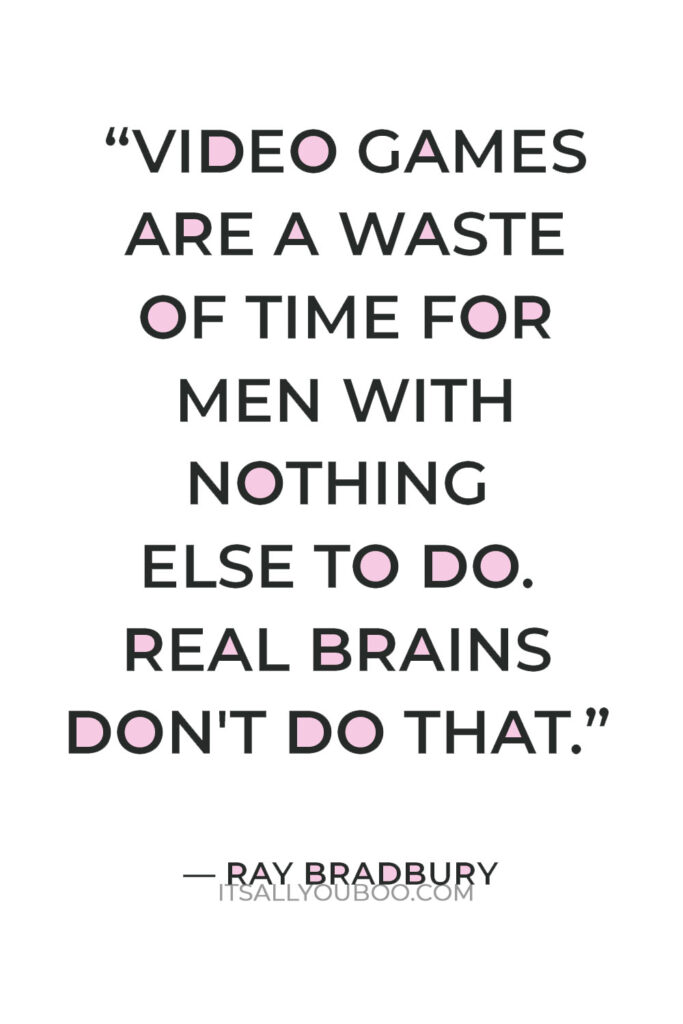
Recognize and Overcome the Signs of Video Game Addiction in Adults
Do you think your video game habits are harmless? They may very well be, but if you’re experiencing any of the above-mentioned symptoms, you may be on the edge of a serious video game addiction.
Take an objective look at your gaming habits. For many addicts, what once was a fun hobby that helped relieve stress is quickly snowballing into a habit that’s controlling and ruining their lives.
The most important thing to remember is that video game addiction doesn’t define you. With the right resources, support, and objectivity, you can break the hold that gaming has on you and reclaim a healthy, productive lifestyle.

Do you experience any of the signs of video game addiction in adults?

More About Guest Contributor
April is a wife, mother, and freelance writer who lives in Florida with her husband and son. April has her MFA in creative non-fiction and 15 years of writing experience. April has written on a wide range of topics but her main focus is health and wellness, education, parenting, and relationships. When she’s not creating content, writing on her own blog (MommysPlayground.net), or reading, she enjoys kickboxing, yoga, hitting the beach, and spending time with friends.
Last Updated on April 21, 2025





